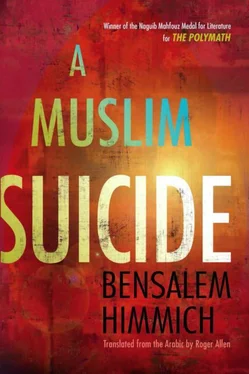"He's with her now. He never leaves her bedside."
"What about `Abla?"
"She's helping serve my aunt."
"And Hafsa?"
"She's in her room. She's ill, or pretending to be."
When I went into her aunt's room, Hamada stood up to greet me, as did 'Abla. Her aunt looked very pale and weak; she was very thin, her eyes looked glazed over, and she was having trouble breathing. When she opened her eyes, it was only to utter some incomprehensible words and not recognize anyone. The young man whispered in my ear that her doctor had given up hope of making her better, and everything was now in the hands of the One who can grant life and death. With that he burst into tears, and my wife and 'Abla both joined in. I could see no point in examining a body wracked by old age and marked by premonitions of life's demise. I read some Qur'anic verses over her, then went to my bedroom without eating anything, fully intending to look into the feasibility of Khalid's being engaged to 'Abla before the aunt died. When my wife joined me late at night, I broached the subject with her, and she was clearly delighted at the idea. She confirmed my notion that, as the saying has it, "the best charity comes quickest."
Next morning Hamada and Abla brought me my breakfast. Without bothering about preliminaries I broached the subject of the engagement.
"If it weren't for the fact that your wife's aunt is so ill," said Hamada, "I would be singing, dancing, and ululating for sheer joy."
`Abla seized my hand, putting it over her heart and then kissing it and bathing it in tears of uncontrollable joy. She raised her hands up high in supplication and gratification: "Master," she said, "your prayers have been answered. You have made me so happy. Now all I ask God is to give you his blessings and bounty!"
And with that she launched into a whole series of other prayers on my behalf. Eventually I asked her when she would like to see the student who had asked for her hand before the engagement was formalized.
"You are my only representative in this matter," she said. "I leave it all in your hands."
"But should we go ahead with the marriage when Fayha" s aunt is close to death?"
"Good heavens, no!" she replied. "All I want is for the young man to be married to me and then take me away with him with no celebration or banquet."
I had not expected such a response, but I proceeded to urge her to be ready for a ceremony the day after next. She accepted with the greatest delight. I now told Hamada where Khalid from Tangier lived and sent him there with a message to the same effect, telling him at the same time not to say a word to anyone. As soon as Hamada had left, Abla frowned and looked grim. She handed me a bottle she was carrying round her neck.
"Take this," she said, "and use it to daub your bedposts. That way, you can keep the poisonous scorpions away."
"My dear girl," I chuckled, "which scorpions are you talking about?"
"If Hafsa finds out that you're the one who's arranged for me to get married," she went on, "she'll go crazy and try to use her poisonous insects to do you harm. Be very careful, master. She's a nasty witch!"
"So, poor girl, it's Hafsa who's been holding you back, is it?"
She nodded her head. With that I let her go, but not before I had calmed her fears and assured her that both she and I would soon be free of this menace.
On the first Wednesday in the current month of Rajab, I informed my wife of what I had decided to do. Close to sunset, I brought Khalid and three confidants to my closet. I made Khalid swear an oath to treat the woman he wished to marry with all due kindness, then allowed him to meet his bride-to-be and spend some time alone talking to her. After that, two legal witnesses arrived with Hamada, and the wedding contract was settled in accordance with the practice enjoined by God and His messenger. Throughout the ceremonies and the small reception afterward, the groom looked absolutely delighted. He leaned over and thanked me for bringing it all about, and received the congratulations of his three companions, duly leavened, of course, by a certain amount of joking and banter.
Once the two witnesses had departed, Khalid immediately started talking. "Thanks to this blessed marriage," he said, "my health and well-being are fully restored. Now I want to remind my master, who is entirely responsible for my happiness, that I made him a promise."
I had not forgotten that he had promised to take my letter to the king of Sicily, but I still wanted to find out why he was so keen to undertake the task when he was only just married.
"During my brief meeting with 'Abla," he told me, "we agreed that our wedding night would be next Friday. Two days later, we plan to travel to Sicily so I can complete this task for my master. Then we plan to visit many other countries. 'Abla is even more eager than I to tour around God's broad and wonderful domains."
His three friends started joking with each other, some of which I could hear. "So Khalid's eager to make attractive nature scenes a partner in his marriage! He needs them as witnesses and to have them dance for him!"
For my part, I was keen to support the groom's decision, and so I asked 'Abd al to record what I said in a neat, clear hand. Here is what I said:
"Praise be to God, the one, the unique!
"From 'Abd al-Haqq ibn Muhammad ibn Sabin to the ruler of the Christians in this age:
"Peace be to the one who emphasized the oneness of God Almighty!
"I have responded earlier to your questions concerning specific philosophical issues. In my reply I used some rather severe expressions, not out of a desire to show contempt but rather as a way of directing your interest toward independent inquiry and research and of provoking deeper levels of questioning and investigation. Any genuinely educated person who is either reluctant or negligent will inevitably go astray and fail to achieve the desired goal.
"In this short letter of mine I shall focus on a single topic, one that I would not be bringing to your attention were it not for the admirable qualities with which God has clearly endowed you: chivalry, generosity, courage, and bravery-traits that are similarly prized by Muslims. All that is over and above the other qualities for which you are already well known to Muslims, the love and estimation that you have already shown for their sciences and your announced inclination toward their cultural values, and that in spite of the opprobrium you have earned from those of your race and religion. With all that background in mind, learn a verse of the noble Qur'an-may God grant you success! — as addressed by Muhammad, the faithful Prophet of Islam, to Heraclius, ruler of the Byzantines at the very outset of his blessed and luminous mission: `You people of the Book, draw close to a word that is common between us and you: that we should worship none but God alone, that we do not associate anything with Him, and that some of us do not adopt others as gods apart from God Himself. If they turn away, then proclaim that we are Muslims.' (The Lord of Mankind has spoken the truth [Sura 3, v. 64].) As it stands, this utterance serves to bring together beneath a single covering firmament of monotheism all those people who aspire to Islam or other faiths and who hope for peace as both a modality and a goal. It is this very statement that Muslims and those People of the Book who support their views have tried to establish, foster, and protect as a basic principle. In so doing they have resorted to creative ideas, sharing of gifts, and development of movements and monuments-all that in the land of Andalus, the ideal society where communities work together and share their learning.
"But in this era of ours we have witnessed an assault launched by those bearing swords and crosses, with the Castilians at their head. Their only goal has been to demolish this creative monotheistic fabric and destroy all dreams of civilization and peace. They have combined forces in order to attack Muslims and bring them low, spreading decay through homes, farmlands, and buildings. Anyone who has resisted them has been crushed and banished, forcing entire families and communities into exile. Since there is neither a religiously based factor to restrain them nor sacred texts from prophets and messengers of the past to give them pause, treaties and pacts have been systematically broken.
Читать дальше












